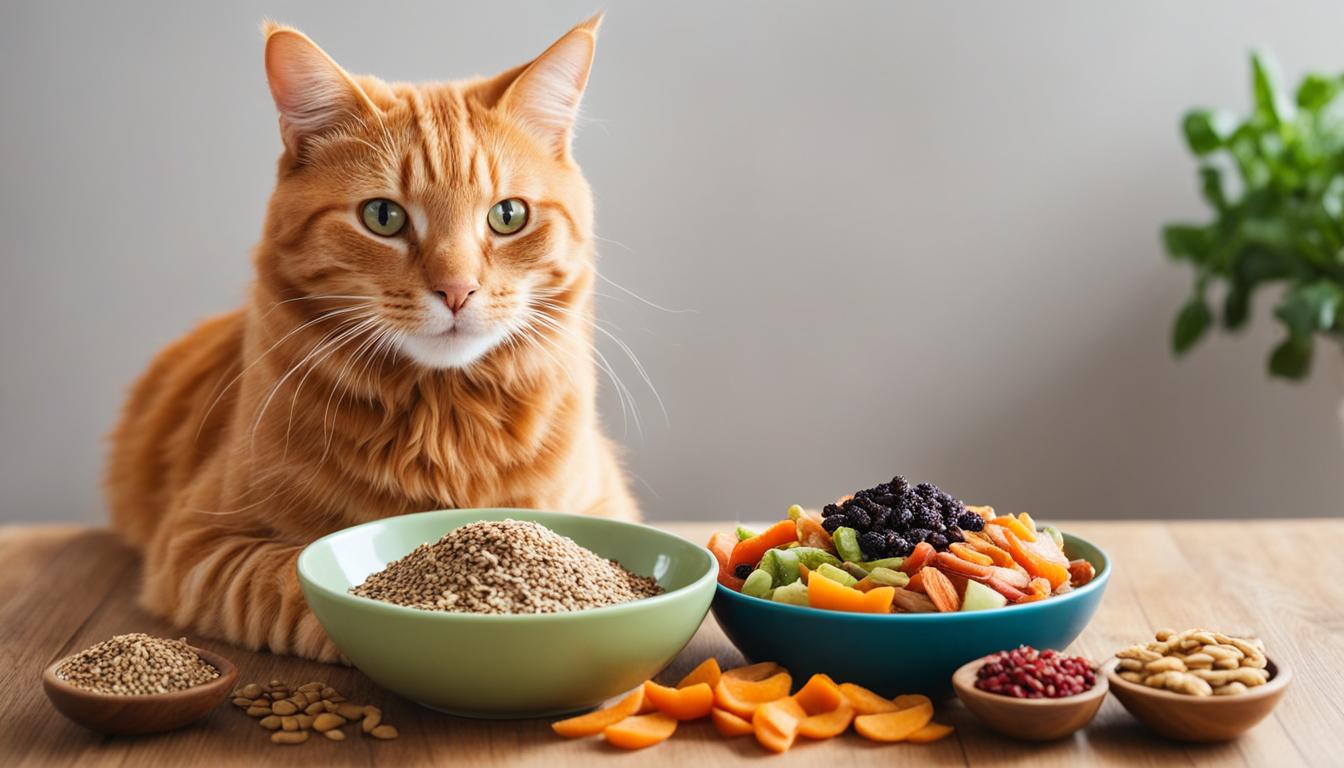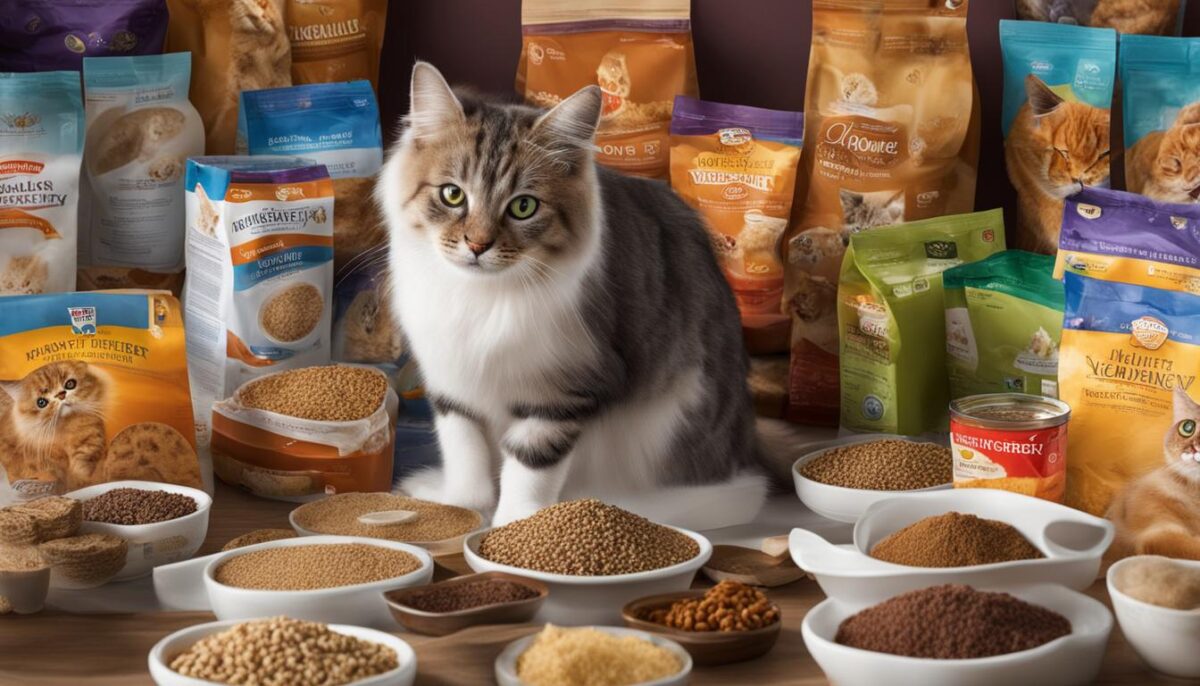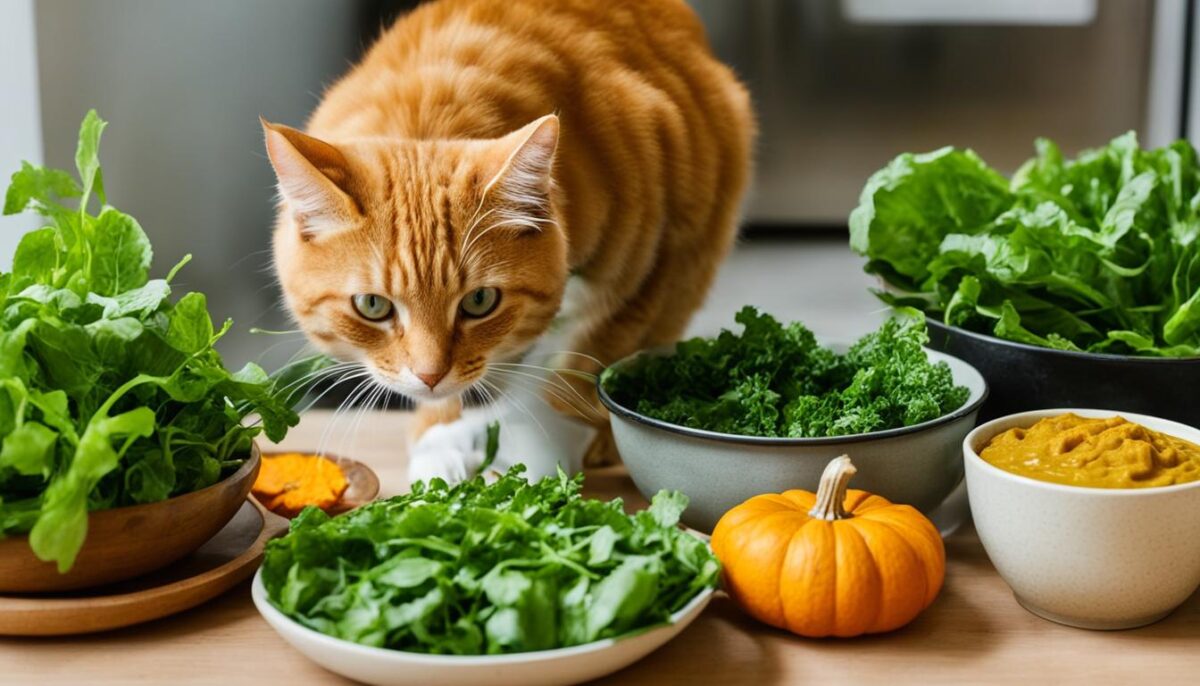Do your cats get a tough time in the litter box sometimes? Yup, cats can get feline constipation, just like people. It means they can’t poop as much as they need to or it’s too hard to pass. If your furry friend is having a hard time or no poops show up in their box, they might be having trouble.
When a cat has cat constipation signs, they might stop eating much or don’t want to play. They could also have a sad tummy and not be their playful self. If you see this, it’s a good idea to talk to a vet. They can help your constipated cat feel better.
If you’re worried about your cat and think they might be constipated, here’s what you need to keep in mind.
Key Takeaways
- Cats can get constipated and it can make them feel bad.
- Signs of trouble include hard time pooping, small poops, or no poop.
- If your cat is not eating or playing, it might be because they are constipated.
- A sad tummy and not being happy can also be a sign.
- Always talk to a vet if you think your cat has feline constipation to get them relief.
Understanding Cat Constipation and Its Implications
When your little furry friend has trouble in the litter box, it might be a sign of constipation symptoms. This may appear simple, but it’s essential for your feline health. Sometimes, constipation can lead to bigger issues like chronic cat constipation or even megacolon.
Constipation means their bowel movements are less frequent and a lot harder to pass. It’s like they want to go, but they just can’t. If you see your cat having a hard time, imagine how uncomfortable they must feel! That’s why you should take them to the vet as soon as you can. You don’t want it to get more serious.
Just like us, cats can have big problems if they don’t go to the bathroom regularly. When it goes on for too long, their intestines might get really big and that’s called megacolon. It’s not fun for them and it can be tough to treat. Don’t wait, because the earlier you catch it, the easier it is to help them feel better.
Here’s what could happen if you don’t treat your cat’s constipation:
- Their poop can get so hard that they just can’t push it out.
- They can end up feeling sick a lot because the poop stays in their body when it should come out.
- If it gets too bad, they might even need surgery to fix their intestines. We really don’t want that!
Remember, keeping an eye on your sweet kitty’s bathroom habits and helping them out quickly can keep them happy and healthy! If you ever have a worry about this, talk to your vet—they’re like doctors for animals and they really want to help.
Recognizing the Signs of Constipation in Your Cat
Constipated kitties might have a tough time in the litter box. Even though they try really hard, they might not be able to go. You can tell something’s wrong when they visit their litter box more but don’t seem to feel better. Being a caring pet parent means spotting the signs early, so let’s learn what to look for together.
Struggling in the Litterbox: Defecation Difficulties
Does your cat look unhappy in their litterbox? Maybe they’re in and out, but their poop looks like tiny, hard pebbles. This isn’t comfy for them and could be a symptom of constipation.
Changes in Behavior: Less Energy and Appetite
If your furry friend feels yucky, they may not want to eat or play much. It’s sad to see but paying attention helps. When cats feel bad, like when they have decreased appetite or show feline lethargy, they need our help.
Physical Discomfort: Signs Your Cat May Show
Ouch! Cats might not say “it hurts”, but they do show pain. Cat abdominal pain is a big deal. If they meow or don’t like tummy rubs like before, they might have a sore belly from constipation.
| Signs of Discomfort | What It Could Mean |
|---|---|
| Hiding More | Wanting to be alone; they may feel sick. |
| Meowing or Hissing | Their tummy may hurt when touched. |
| Not Using the Litterbox | Could be cat litterbox problems from painful pooping. |
| Not Eating | Possible constipated cat symptoms affecting appetite. |
| Not Playing | Could be feline lethargy, meaning they’re too tired or hurt to play. |
Spotting discomfort signs in cats and recognizing feline pain is super important. You love your furball, so keep an eye on these clues and chat with your vet when you need to. They’re the best at helping us understand what’s up with our kitty pals.
Can Cats Get Constipated?
Hey there! Did you know that your furry friend can have trouble going to the bathroom? It’s true! Cats can get constipated, and it’s one of those common cat health problems you might face. Just like you, cats can feel bunged up and uncomfortable.
When cats are constipated, they might feel really nervous or have a health problem like kidney disease. Not moving around enough can also make it hard for them to poop. So if you see your kitty having a tough time in the litter box, it’s a good idea to visit the vet.
Let’s look at some quick feline constipation facts. Cats don’t always show they’re not feeling well, so it’s important for you to understand their bathroom habits. Here’s a handy table to help you know when to worry and what to do:
| What to Watch For | What It Might Mean | What to Do |
|---|---|---|
| Litter box visits with no luck | Possible constipation | Call the vet |
| Hard, dry poop | Not enough water or exercise | Check their water and play with them |
| Meowing more than usual | They might be in pain | Give them gentle belly rubs and visit the vet |
One last thing, if your cat eats something strange they can get really sick, really fast. It’s super important to take them to the vet, especially if they’ve swallowed something they shouldn’t have. That could be a big emergency!
Always pay close attention to your cat’s habits, so you can catch any issues like constipation early. By understanding constipation in cats, you can help keep your kitty happy and healthy!
Exploring the Causes Behind Constipation in Cats
Have you ever had a hard time going to the bathroom? Well, cats can have that problem too – it’s called constipation. Let’s figure out why this happens and how we can help our furry friends stay happy and healthy.
From Dehydration to Disease: Contributing Factors
Cat health issues like not drinking enough water can lead to feline dehydration, making it hard for them to use the litterbox. If your cat has a disease like diabetes, getting constipated can be extra easy for them. It’s a big deal to make sure they are feeling okay, so a trip to the vet can help a lot.
Lifestyle Factors: Litterbox Issues and Lack of Exercise
If your cat’s litterbox isn’t clean or they don’t like it for some reason, they might stop using it. This can end up causing trouble with constipation. Cats also need to exercise to keep everything moving inside them, so play with your cat and keep them active to prevent constipation.
Diet and Hydration: Potential Dietary Causes
The food your cat eats is super important for keeping their tummy happy. They need the right nutrition and lots of water, too. If they aren’t excited about drinking water, try a new bowl or even a fountain. They might like that better! And for food that’s easy on their tummy, your vet will know just what they should eat. Let’s help our cats feel their best every day!
| Issue | Why It’s Bad for Your Cat | How You Can Help |
|---|---|---|
| Not drinking enough | Poor hydration can lead to hard, dry stools | Provide fresh water or a pet fountain |
| Diseases | Health issues like kidney problems could cause constipation | Visit the vet regularly for check-ups |
| Dirty litterbox | Cats avoid unpleasant litterboxes, holding in waste | Keep the litterbox clean and accessible |
| Not enough playtime | Lack of activity can slow down digestion | Encourage play and cat exercise |
Professional Diagnosis: How Vets Assess Constipation in Cats
If your furry friend is having a hard time in the litter box, a vet consultation for constipation is a smart step. When you take your cat to the vet, they will have a careful look and ask you questions about your cat’s eating and bathroom habits. This chat helps the vet understand what might be making your kitty feel yucky.
Sometimes a vet can tell if your cat is constipated just by feeling their tummy. If the vet thinks more help is needed to know what’s going on, they might use special tools. X-rays can let them see inside your cat, and blood tests can show if there’s a sickness causing the bathroom troubles. All this helps figure out the best feline constipation treatment to make your cat happy and healthy again.
Remember, a veterinary diagnosis is really important. It makes sure your cat gets the care they need. So if your kitty isn’t pooping right, don’t wait—take them for a vet visit to get things moving smoothly!
FAQ
Can cats experience constipation?
Yes, cats can become constipated. This is a condition where they may have infrequent, hard bowel movements, or sometimes none at all.
What are the signs that my cat might be constipated?
Signs of a constipated cat include fewer stools in the litter box, stools that are hard or look like little pellets, a cat trying to defecate with difficulty or not at all, vomiting, reduced appetite, lethargy, and abdominal pain.
What should I do if I think my cat is constipated?
If you notice signs of constipation in your cat, it’s important to take them to the vet as soon as possible. Early detection and treatment are crucial.
What could happen if cat constipation is ignored?
Ignoring a constipated cat can lead to severe complications such as obstipation or megacolon, conditions that are difficult to treat.
Why is my cat experiencing constipation?
Constipation in cats can be caused by numerous factors including dehydration, insufficient exercise, dietary issues, underlying health problems like kidney disease or diabetes, stress, and even litterbox aversion due to cleanliness or accessibility.
How important is water intake for preventing cat constipation?
Water is very important for feline health, particularly for preventing constipation. Ensure your cat has access to fresh water at all times, and consider providing a cat water fountain if they prefer flowing water.
Could my cat’s litterbox be causing constipation?
Yes, if the litterbox is dirty, difficult to access, or otherwise unappealing, a cat might avoid using it, which can lead to constipation.
How does diet affect my cat’s bowel movements?
The right diet is essential for healthy digestion. Certain foods may cause constipation, so it’s important to consult your vet to find the best dietary options for your cat.
How do vets diagnose constipation in cats?
Vets may diagnose constipation through a physical examination, feeling the cat’s abdomen, and possibly conducting further tests such as X-rays or blood tests to determine the underlying cause.
Can constipation indicate a serious health issue in cats?
Yes, constipation can be a symptom of serious underlying health issues, so it’s essential to consult with a vet to rule out any significant concerns.
Is lack of exercise a reason for my cat’s constipation problems?
Lack of exercise can contribute to constipation in cats. Regular play and activity help their digestive system function properly.
How can I prevent constipation in my cat?
Preventative measures include maintaining a clean and accessible litterbox, ensuring proper hydration and nutrition, providing regular exercise, and monitoring your cat for any health changes.


